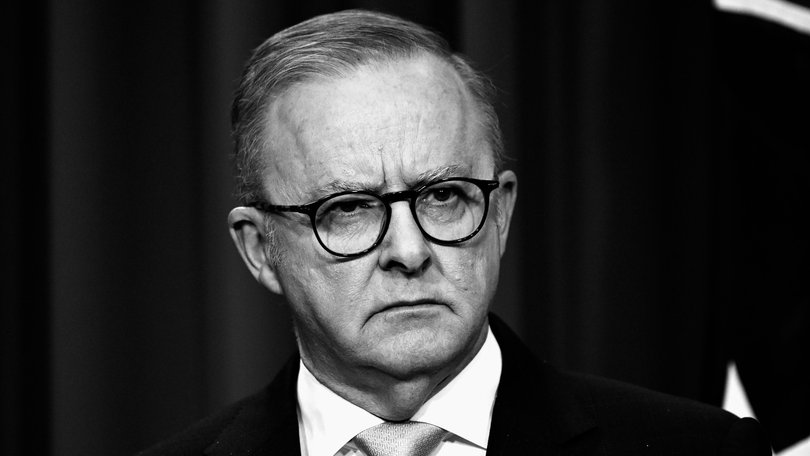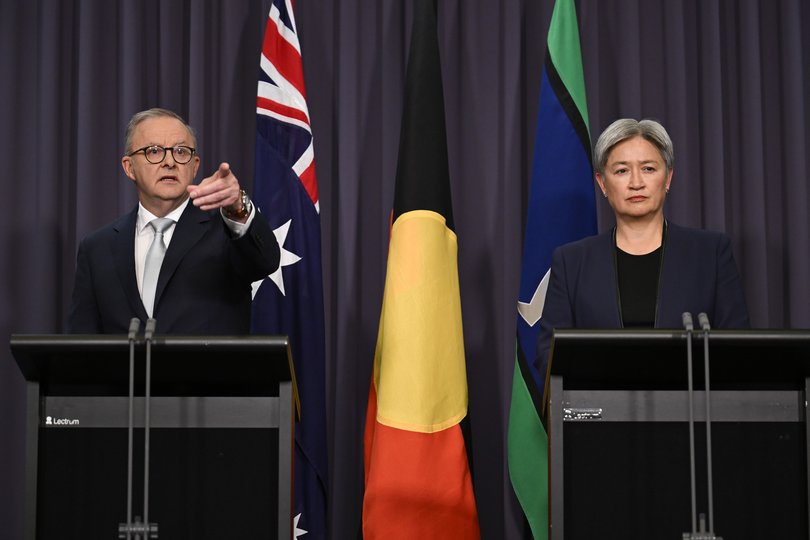ANDREW CARSWELL: Australian Prime Ministers have long fought to have our nation’s voice heard. Not Albanese
ANDREW CARSWELL: The Albanese Government remains profoundly underwhelming on the world stage, diminishing Australia’s standing with every utterance.

In his first week as PM, Anthony Albanese promised to normalise global relations for Australia, restore global credibility and choose diplomacy over division.
Not that things were broken.
It was less a serious critique of Australia’s foreign relations and more a partisan boast — a Labor flourish built on the economic fallout from the Morrison government’s justified finger pointing at China over COVID, and the gripes of a sulking France whose submarines were, frankly, subpar.
Sign up to The Nightly's newsletters.
Get the first look at the digital newspaper, curated daily stories and breaking headlines delivered to your inbox.
By continuing you agree to our Terms and Privacy Policy.Three years on, the Albanese Government remains profoundly underwhelming on the world stage, diminishing Australia’s standing with every utterance.
Through deference and appeasement, its reluctance to back Israel as strongly as our friendship and shared values warrant, its knee-bend to China, and its refusal to constructively engage with the Trump administration, the Government has rendered Australia irrelevant in global affairs.
It has been seen, and judged, for consistently highlighting the wrong issues and picking the wrong sides.
A long line of successive prime ministers have refused to see Australia as a diminutive power on the world stage, pushing for the nation to have greater relevance in global affairs, international forums and trade talks than our population base would warrant.
We’ve earned our standing by showing up, supporting allies, and backing principles.
But the Albanese Government prefers the safety of the sidelines — always careful not to offend or confront, whether domestic groups or foreign nations. “No one left behind” has become less a motto of inclusion and more an excuse to avoid criticism. No one maligned. Ever.
At the heart of this appeasement is not just a failure to act, but the reliance on language that is insipid and evasive, never straying far from a DFAT briefing note.
In response to targeted US action against Iran, the Prime Minister’s alliterative mantra of “diplomacy, dialogue, de-escalation” may resonate within the Department of Foreign Affairs and Trade, but it lacks the conviction expected of a leader navigating a world marked by rising geopolitical tension and increasingly assertive authoritarian regimes.
We’re just little old Australia. Down here at the arse end of the world, minding its own business. What can we possibly do?
Irrelevant.
As has been proven, “diplomacy, dialogue and de-escalation” would not have stopped Iran from developing a nuclear weapon. It would not have stopped Iran from using said weapon to wipe Israel from the map. Regimes like Iran don’t speak DFAT.
To believe anything different is fantasy. A dangerous fiction.
Such placating language does not defy tyranny. It encourages it. It emboldens it, with dictators smiling in the face of such pacifying, vague pronouncements that showcase a willingness to fight them only with carefully constructed words, rather than action. All carrot, no stick.

Tyranny flourishes where leadership merely talks and never acts.
Even when stronger words do follow, usually after media backlash, they ring hollow. There is a distinct lack of believability.
There was nothing wrong with Foreign Minister Penny Wong’s words yesterday in support of the US actions to bomb Iranian nuclear facilities. The words were fine.
Just a day late and minus the conviction.
When the PM finally stepped up to the plate, after leaving the initial response to a Government spokesperson, his mouth attempted to convince the nation that he truly, madly, deeply supported the bombing raid.
His face said otherwise. His words never strayed from the narrow talking points his officials implored him to say. He wanted to be anywhere but at that lectern.
It was abundantly clear that the pair did not believe their own words.
This approach has long been employed by Wong in response to Israel, even stretching back to the first words spoken against the terror attacks on October 7, 2023; words that said that Australia “recognised” Israel’s right to defend itself. Even lesser friends of Israel said they “supported” that right.
That was the starting point. Wong never left the wrong side of that argument.
This passive internationalism is evident in the Government’s response to US calls for Australia to lift its defence spending from a piddly 2.03 per cent of GDP to 3.5 per cent.
If reports from the media briefings at last week’s G7 are accurate, Albanese planned to navigate his meeting with Donald Trump by arguing that Australia shouldn’t be pressured to increase its defence spending, given its consistent role in hosting US forces.
Like that was a thing.
The likely response from the US President would have been fallen somewhere between indignation and fury.
The US has official bases in Germany, Italy and the UK, and all three countries are committed to the NATO defence target of 5 per cent of GDP.
Is there a price to pay for such a pathetic posture?
When Trump cancelled his final meetings at the G7 leaders meeting to scream home to Washington to address the Iranian saga, he called the spurred leaders of Mexico and India for a phone meeting, inviting the latter to swing by DC on the way back to Delhi.
For Albanese, also robbed of his long-awaited meeting?
Radio silence.
The price of irrelevance.
